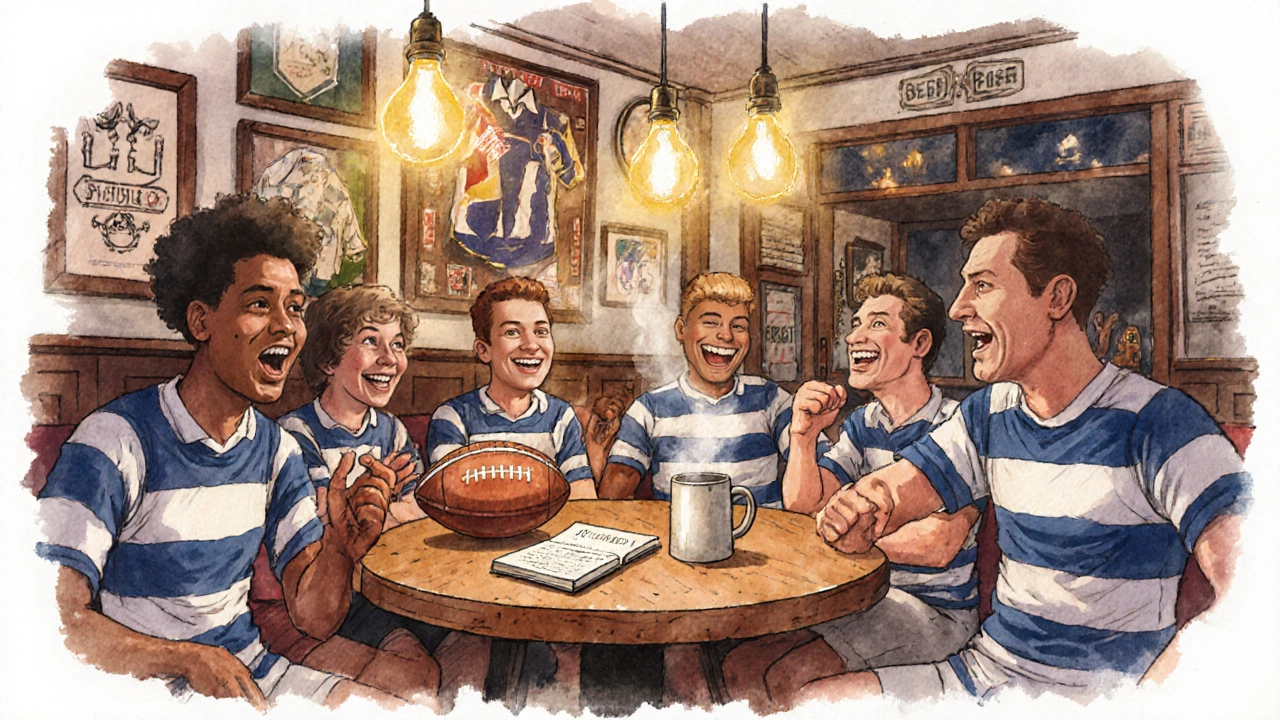When you hear fans shouting "Gooners!" or a player bragging about a "pick and go," you’re stepping into the colorful world of Rugby slang - the informal language that gives the sport its character. It’s the shorthand that makes a post‑match chatter sound lively, helps teammates bond in the locker room, and lets casual fans feel part of the community without a rulebook in hand.
Why Rugby Slang Matters
Slang isn’t just filler; it reflects history, regional pride, and the physical nature of the game. In Melbourne, a "wallop" means a hard tackle, while in Wales a "cannonball" describes a powerful run. Knowing the lingo can:
- Speed up communication on the field.
- Make you sound like a true supporter when you watch a live fixture.
- Help you decode match reports that pepper articles with nicknames.
Core Rugby Terms That Spawn Slang
Before diving into the nicknames, it helps to understand the base concepts they modify. Below are the key official terms that most slang builds on.
- Rugby union is the 15‑a‑side code governed by World Rugby, known for its set‑pieces and continuous play.
- Rugby league is the 13‑a‑side variant that emphasizes faster pace and a six‑tackle rule.
- Scrum is the contested restart where eight forwards from each side bind together to compete for the ball.
- Try is the primary scoring method, worth five points when the ball is grounded in the opponent’s in‑goal area.
- Ruck forms when a tackled player goes to ground and opponents compete over the ball on their feet.
- Maul occurs when the ball‑carrier is held upright and teammates bind onto them while moving forward.
- Lineout is the method of restarting play from the touchline, where players are lifted to catch a thrown ball.
- Hooker is the front‑row player who “hooks” the ball in a scrum and often throws in lineouts.
- Fly‑half directs the backline, makes tactical kicks and decides when to run or pass.
Common Rugby Slang Across the Globe
Below is a quick‑read list of the most heard slang, what they really mean, and where they originated.
| Slang | Official Term | Meaning | Region |
|---|---|---|---|
| Gooner | Supporter of Arsenal FC (used humorously in rugby circles) | Someone who cheers loudly, often in a tongue‑in‑cheek fashion. | UK |
| Pick and go | Forward pick‑up and immediate drive | A quick, powerful run after a set‑piece. | Australia |
| Wallop | Hard tackle | A tackle that stops the ball‑carrier dead in his tracks. | Australia |
| Cannonball | Powerful ball carrier run | A straight, forceful run that breaks the defensive line. | Wales |
| Bag of chips | Group of forwards | A tightly packed pack that scrums like a solid block. | South Africa |
| Boot | Kick | Any strategic or clearing kick. | International |
| Scrummy | Well‑executed scrum | A scrum that wins cleanly and quickly. | New Zealand |
| Back‑hand | Pass from the side of the body | A pass that flies just off the shoulder, catching defenders off guard. | England |
| Turnover | Loss of possession | When the defending team gains the ball after a ruck or maul. | International |
| Sin bin | Temporary suspension (yellow card) | Five‑minute exile for repeated infringements. | International |

Regional Flavours of Rugby Lingo
Even within the English‑speaking world, the same concept can have multiple nicknames.
- Australia: "Wallop," "Pick and go," and "Dad‑bomber" (a massive forward attack).
- New Zealand: "Scrummy," "Hard‑bag" (a strong pack), and "Switch‑off" (quick change of direction).
- United Kingdom: "Cannonball," "Biff" (heavy tackle), and "Grubber" (low kick).
- South Africa: "Bag of chips," "Mooch" (slow forward), and "Bok‑buzz" (when the Springboks dominate).
How to Use Rugby Slang Correctly
Mixing slang with official commentary can sound authentic, but there are pitfalls:
- Know your audience. A broadcaster’s live call‑out should stay mostly formal; friends in a pub can go full slang.
- Don’t over‑use. Dropping a slang term every sentence feels forced.
- Match the code. Some terms belong to union, others to league - using "six‑tackle" in a union context confuses listeners.
- Respect the culture. Certain nicknames can be region‑specific; calling a New Zealand player a "cannonball" might raise eyebrows.
Cheat Sheet: Quick Reference for New Fans
If you’re watching a match and need a fast lookup, here’s a condensed list.
- Wallop - hard tackle
- Pick and go - forward run after a set piece
- Cannonball - powerful ball‑carrier break
- Scrummy - clean scrum win
- Sin bin - temporary suspension (yellow card)
- Turnover - loss of possession, gaining team
- Bag of chips - solid pack in scrum
- Back‑hand - side‑arm pass
- Boot - any kick, especially tactical
- Gooner - loud supporter, used humorously

Common Misunderstandings and How to Avoid Them
Even seasoned fans slip up. Here are three classic mix‑ups and the fix.
- Mixing “scrum” and “scrummy”. The former is the set‑piece; the latter praises execution. Use “scrum” when describing the event, “scrummy” when complimenting it.
- Calling a lineout a “throw‑in”. A throw‑in is a restart from the touchline in soccer. Reserve “lineout” for rugby.
- Using “kick” for a “boot”. “Boot” connotes a strategic or clearance kick, while “kick” can be any foot contact.
Key Takeaways
- Rugby slang brings personality and speeds up on‑field chatter.
- Learn the base terms first - they’re the building blocks of nicknames.
- Regional variations matter; a term popular in Melbourne might be unheard of in London.
- Use slang sparingly and match the setting - broadcast, locker room, or casual fan talk.
- Keep a cheat sheet handy when you watch a new fixture.
Frequently Asked Questions
What does "wallop" mean in rugby?
"Wallop" is Aussie slang for a hard, driving tackle that stops the ball‑carrier dead in his tracks.
Is "pick and go" only used in Rugby Union?
It’s most common in Union because it describes a forward’s quick pick‑up from a lineout or scrum, then an immediate drive. League callers might use "pick‑up" but rarely add "go".
Why do New Zealand fans say "scrummy"?
"Scrummy" combines "scrum" with the affectionate suffix "‑y" to praise a clean, fast‑winning scrum. It reflects the Kiwi love for efficient set‑pieces.
Can I use rugby slang when speaking to a coach?
Coaches usually prefer formal language during training. Save slang for off‑field chat or post‑match banter to avoid misinterpretation.
What’s the difference between a "ruck" and a "maul"?
A ruck forms when the ball is on the ground and players contest it on their feet. A maul occurs when the ball‑carrier stays upright and teammates bind onto them while moving forward.
